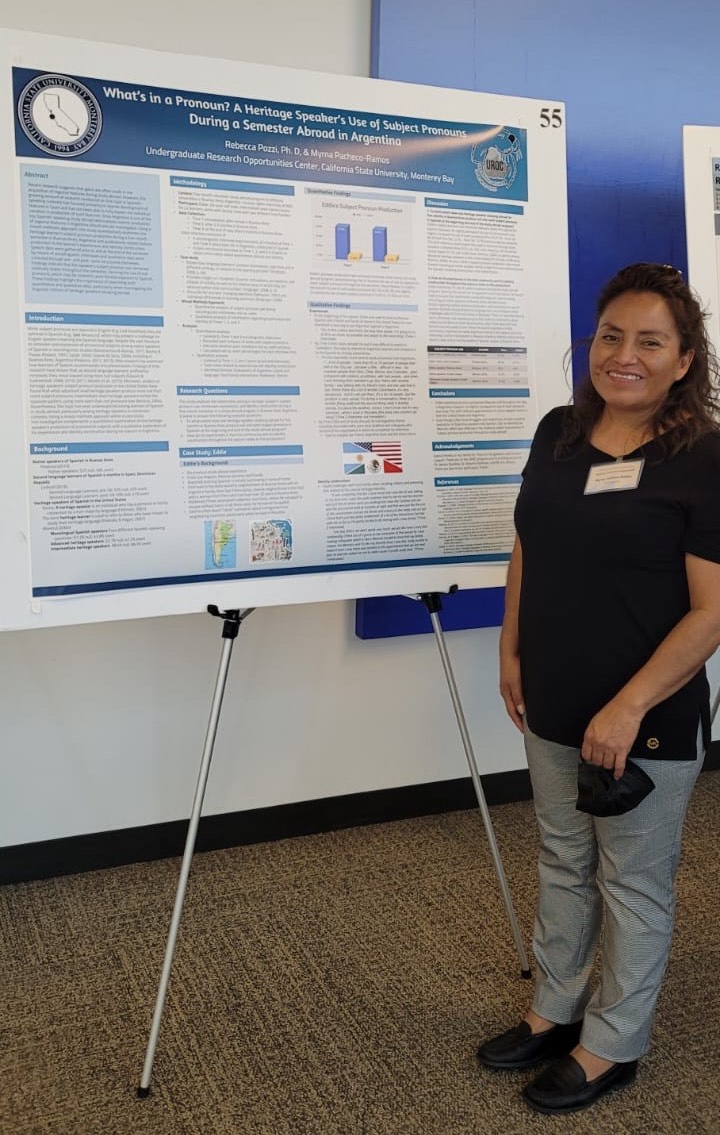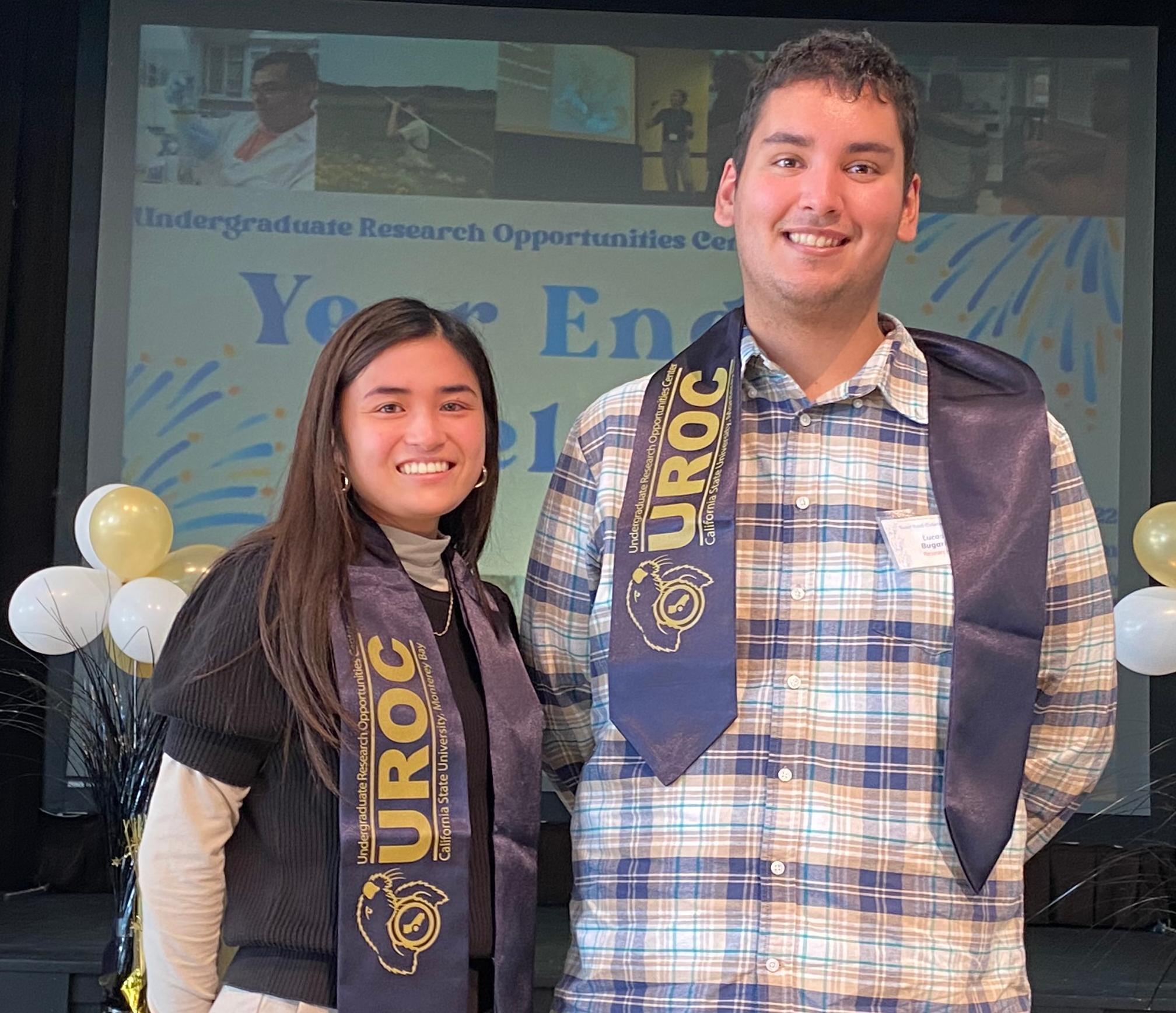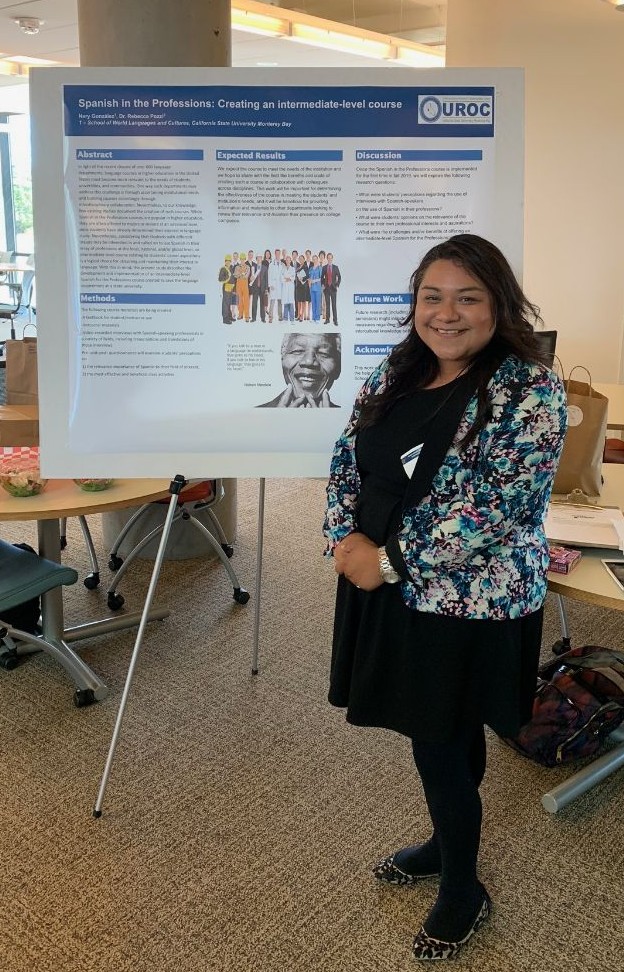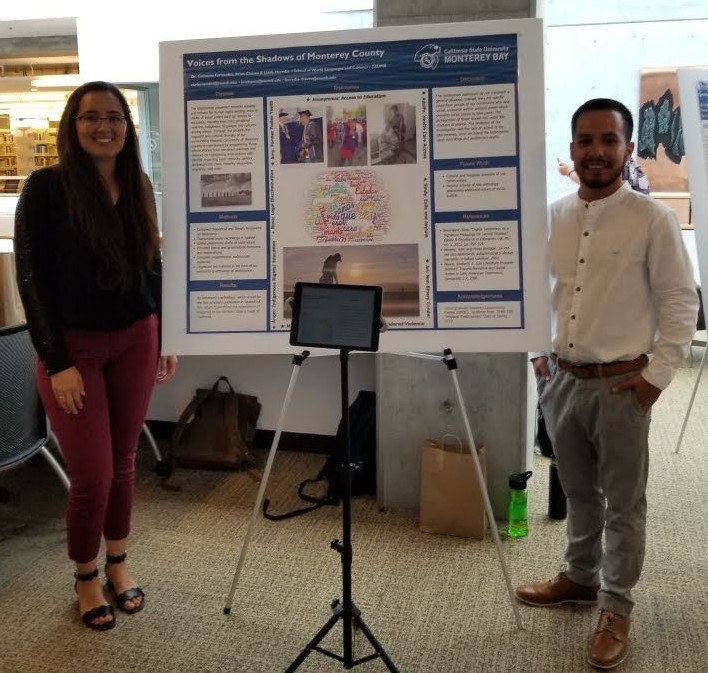World Languages and Cultures
UROC Research Opportunities! Spanish Major Students Projects and Presentations
Congratulations to students from the WLC Major in Spanish Language and Hispanic Cultures who have conducted research and/or presented their research projects at UROC Research opportunities. The Undergraduate Research Opportunities Center at CSUMB creates opportunities through an ongoing Summer Research Symposium series for undergraduate students to conduct original research in collaboration with CSUMB faculty members.
Click the appropriate 'accordion' at the bottom of the page to learn more about each project.
2022 UROC! Spanish Major Student Presents Summer Research Project
UROC mentee Myrna Pacheco-Ramos presented at the Summer 2022 UROC Summer Research Symposium on the project entitled “What’s in a Pronoun? A Heritage Speaker’s Use of Subject Pronouns During a Semester Abroad in Argentina”, conducted in collaboration with Rebecca Pozzi, Ph.D.

Myrna Pacheco-Ramos
2022 UROC Participants
Congratulations to UROC participants Hana Jacinto JLC ’22, (Koret Scholar 2022) and Lucas Bugarín SLHC ’22, (POPPY Grant 2022).

2019 UROC! Spanish Major Students Present Summer Research Projects
Nery González worked under the guidance of Dr. Rebecca Pozzi on creating materials for SPAN 340, Spanish for Professions for an Intermediate level of proficiency in Spanish.

Linda Heredia Chávez and Brian Chávez collaborated with Dr. Christine Fernandez on the Anthology of Hispanic Testimonios of Monterey County

Click the headlines below to learn more about their projects.
Myrna Pacheco-Ramos* & Rebecca Pozzi, Ph.D.
“What’s in a Pronoun? A Heritage Speaker’s Use of Subject Pronouns During a Semester Abroad in Argentina”
Abstract While subject pronouns are required in English (e.g. I eat breakfast), they are optional in Spanish (e.g., [yo] desayuno), which may present a challenge for English speakers. Despite the vast literature on omission and expression of pronominal subjects among native speakers of Spanish, little research has examined how learners of Spanish accommodate this phenomenon. Findings of that research have shown that, as second language learners’ proficiency increases, they use more null subjects. Nevertheless, this topic has been underexplored among heritage speakers of Spanish in immersion contexts. Using a mixed-methods approach, this study quantitatively examines one heritage speaker’s subject pronoun production during a five-month semester in Buenos Aires, Argentina and qualitatively relates this production to the speaker’s experiences and identity construction. Speech data were gathered prior to and at the end of the semester by means of sociolinguistic interviews and qualitative data were collected through pre-, mid-, and post- semi-structured interviews. Findings indicate that the speaker’s subject pronoun use remained relatively stable throughout the semester, favoring the use of null pronouns, which may be related to prior familial exposure to Spanish. These findings highlight the importance of examining both quantitative and qualitative data, particularly when investigating the linguistic choices of heritage speakers studying abroad.
Lucas Bugarín conducted research with Dr. Rebecca Pozzi resulting in the following presentations:
Bugarín, L. & Pozzi, R. (May 2022). Yo, sho, or zho? Examining students' dialectal choices during a semester abroad in Buenos Aires. Presented by L. Bugarín at CSU Social Science Student Symposium (CSU SSRIC).
Bugarín, L. & Pozzi, R. (April 2022). "Nobody uses that here": Case studies of students' development of sociolinguistic competence in Argentina. Presented by L. Bugarín at CSUMB’s Research, Scholarship, and Creative Activity Spring Showcase.
Bugarín, L. & Pozzi, R. (November 2021). Fitting in with Porteños: Case studies of dialectal feature production, investment, and identity during study abroad. Presented by L. Bugarín at Southern California Conferences for Undergraduate Research (SCCUR).
Linda Heredia Chavez*, Brian Chavez*, & Dr. Christine Fernandez
The anthology “Hispanic Testimonios of Monterey County” discloses various issues of social justice and its intersections with race/ethnicity, politics, gender, social class, among others from people with Hispanic heritage. As of date only two other scholarly publications in Spanish document the experiences of Hispanics in southern California such as Otras voces, nuevas identidades en la frontera sur de California (2017) as well as 21 Miles of Scenic Beauty...and then Oxnard (2011). The methods implemented include transcribing audio recording in Spanish, editing preliminary drafts of oral histories, compiling supplemental audiovisual materials, and collaborating on the organization of the material in the form of an enhanced e-book. The final product of this research is an enhanced e-anthology, which is considered to be the first scholarly publication in Spanish of this nature in the northern-central coast of California. The testimonios presented contribute for equality and respect for human rights. It will promote the active participation of the people, as well as the creation of a solid and secure platform to create awareness surrounding cases of social justice. Through this project, the linguistic and cultural diversity of our community is well represented by empowering those whose stories have been under the shadow.
See more presentations from CSUMB UROC researchers!
Nery Gonzalez* & Dr. Rebecca Pozzi
In light of the recent closure of over 600 language departments, language courses in higher education in the United States must become more relevant to the needs of students, universities, and communities. One way such departments may address this challenge is through ascertaining institutional needs and building courses accordingly through interdisciplinary collaboration. Nevertheless, to our knowledge, few existing studies document the creation of such courses. While Spanish in the Professions courses are popular in higher education, they are often offered to majors or minors at an advanced level, once students have already determined their interest in language study. Nevertheless, considering that students with different majors may be interested in and called on to use Spanish in their array of professions in local, national, and/or global contexts, an intermediate-level course relating to students' career aspirations is a logical choice for obtaining and maintaining students' interest in language. With this in mind, the present study describes the course development and implementation of an intermediate-level Spanish for the Professions course created to save the language requirement at a state university. We expect the course to meet the needs of the institution and we hope to share with the field the benefits and costs of creating such a course in collaboration with colleagues across disciplines. This work will be important for determining the effectiveness of the course in meeting the students' and institution's needs and it will be beneficial for providing information and materials to other departments looking to renew their relevance and maintain their presence on college campuses.